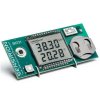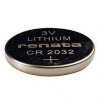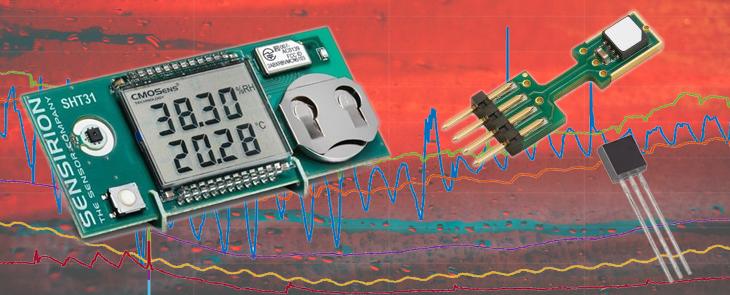
This development kit is a very user-friendly and at the same time very sophisticated device for measuring temperature and relative humidity (RH) with the possibility of exporting measured lines (the first data in the line is Unix time and the other one is temperature or RH) in two files corresponding to temperature and RH recording.
Export is possible via the included Bluetooth (BT) module in communication with the Android or iOS application SensirionMyAmbience. The measurement error specified by the manufacturer is ±2% for RH and ±0.3°C for temperature. The SensirionMyAmbience application also allows you to view the measured data of both measured quantities directly in the mobile phone in the time period of 10 minutes, 1 and 6 hours, 1 day, 1 and 4 weeks.
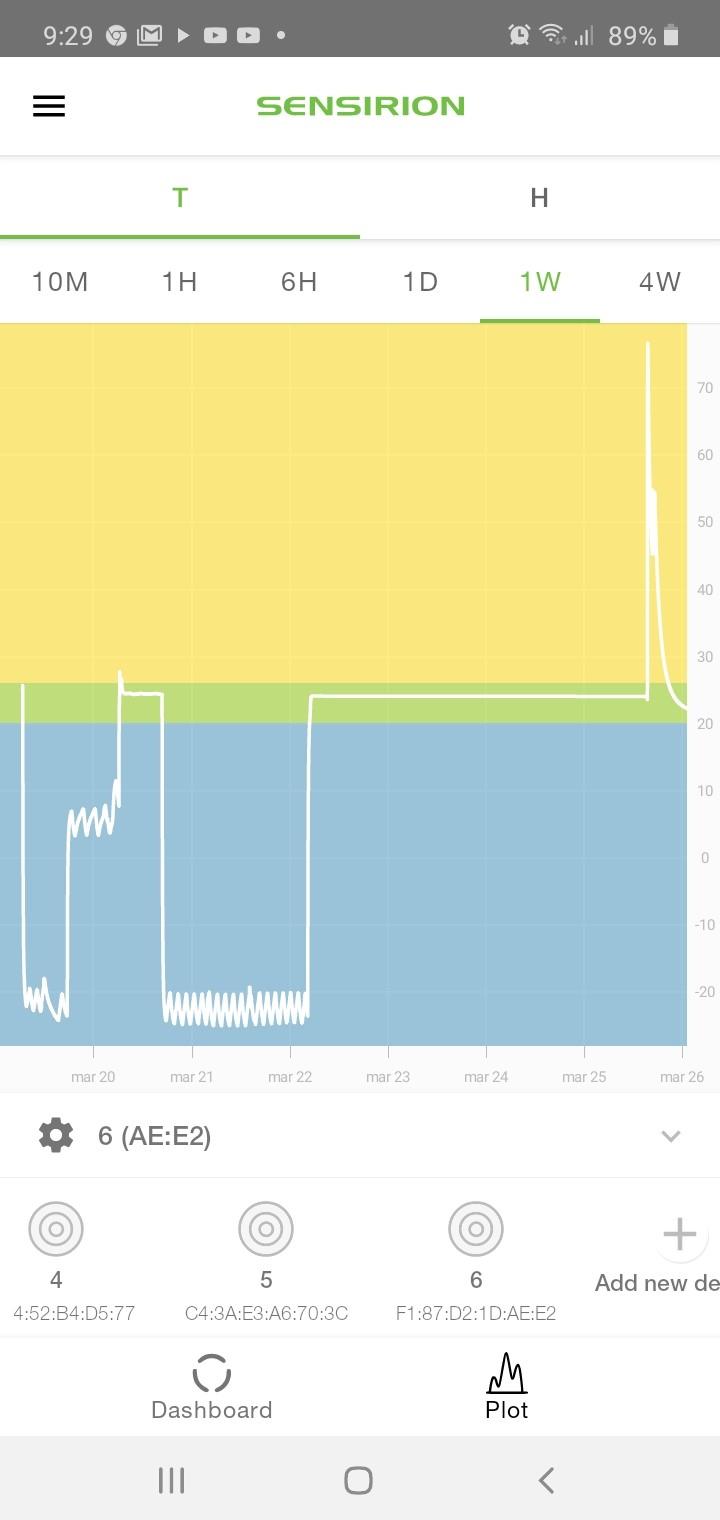
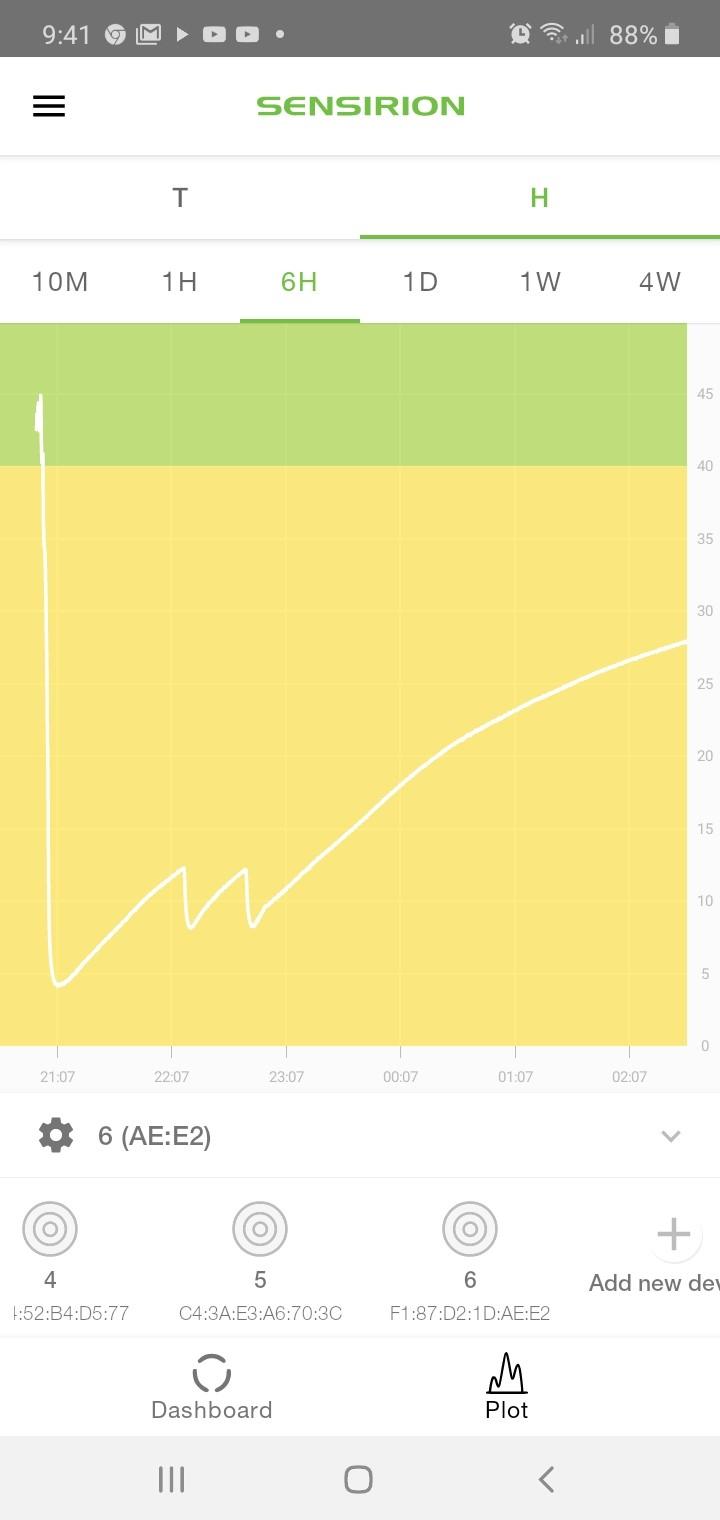
The long straight part represents the omitted data after changing the measuring interval before starting the temperature measurement in the oven.
The second figure on the right illustrates the change in RH during the measurement in the already mentioned oven.
What findings do we have from the long-term and relatively frequent use of SHT31 SMART GADGET?
BATTERY CAPACITY
With each month of measurement, it was possible to observe a certain decrease in the capacity of the CR2032 battery. The question was: How long will it be possible to measure with the Gadgetom SHT31 without the need to replace the battery?
There is a known case where the SHT31 device, which was used rather as an aesthetic accessory (without exports of measured data), has been measuring for almost three years without the need to replace the battery. The devices that we had have been used more than 70 times in 13 months period. The measurements lasted several hours up to four weeks and took place indoors as well as outdoors. Relatively frequent turning on of BT for data transmission (sometimes we even forgot to turn the BT off), as well as measurements in the refrigerator, freezer, water at 0°C or in the oven, affected the battery capacity.
The following graph illustrates the graphical dependence of the battery capacity on the number of months in percentage. (Graph1)
It shows a sharp drop in the battery capacity of one SHT31 (red colour) - this is the device with the BT turned on for 24 hours.
The following graph illustrates the course of changes in the battery capacity of the remaining three SHT31 after measurements in the freezer, refrigerator or at 0°C, while the points in the graph indicate the export time of the measured temperature and RH data. (Graph2)
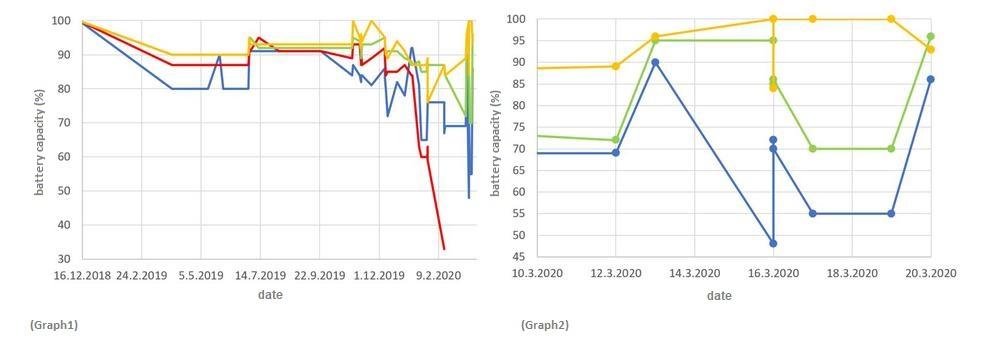
The course of changes in the battery capacity of the other four later used SHT31 Gadgets is also interesting.
After eight months of use, it is clear that the battery shown in green has the worst results (Graph3).
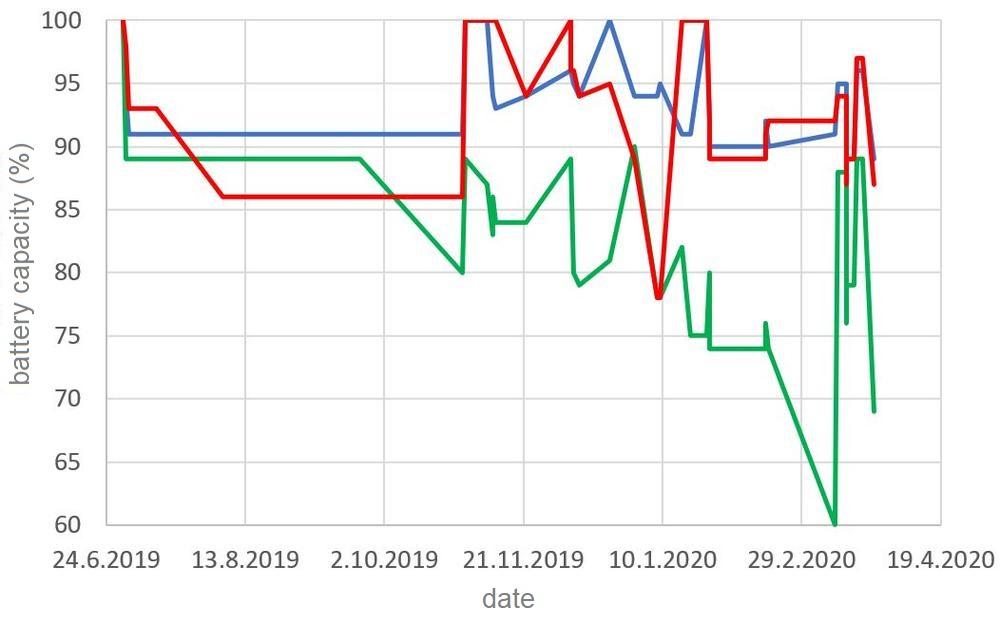
When the battery capacity drops to around 33% (battery voltage ≈2.6 V), it is not possible to turn on the BT and use it to transfer data to the mobile device. The well-known SHT31 display with RH and temperature data shows the “empty” battery icon, and sometimes the RH and temperature data disappears, and only the “empty” battery icon stays present.
The capacity of the battery will decrease rapidly when you need to turn on the BT for a long time, or when measuring temperatures on a large scale.
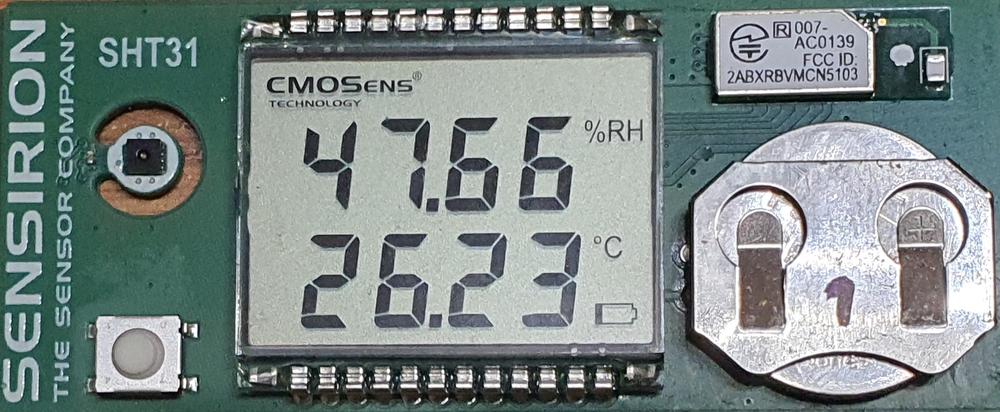
EXPORT OF THE MEASURED DATA
You can export the data after clicking on the settings icon (grey gear) on the screen of the SensirionMyAmbience application, where:
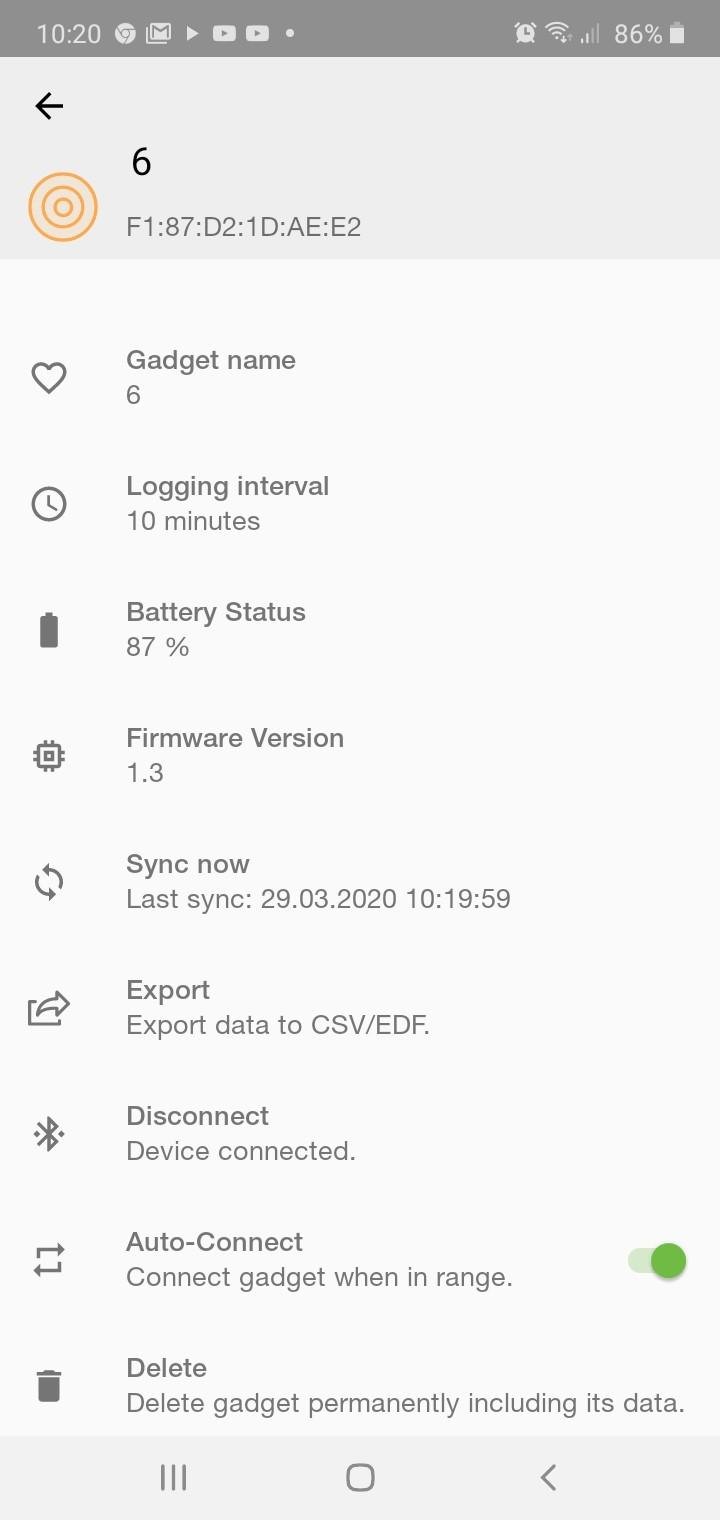
Gadget name – allows you to change the device name, Logging interval - offers the option to select the measurement interval from 1s, 10s, 1 min., 5 min., 10 min., 1 hr. and 3 hrs.
Battery Status – shows the battery status in %,
Firmware version – announces the current firmware version,
Syncnow – indicates the date and time of the last synchronisation of the mobile phone with the device,
Export – enables the export of measured data, e.g. to e-mail in a text attachment,
Connect – allows you to connect an SHT31 device,
Auto-Connect – if the device is within range of BT, it will automatically connect it via BT to the mobile phone,
Delete – deletes the current device from the device list.
By selecting Syncnow and then Export it is possible to, e.g. email two files, one for temperature and the other for RH.
Subsequent processing of the measured data, conversion of Unix time into understandable time for the user and use in graphs, is described in the already mentioned article on our website.
It is possible to export around 17,000 lines (omitting previous and ongoing measurements); however, if we need the realistic export, with the minimal omission of measured data, we can count on around 9,000 lines.
To make this possible, it is necessary to remove the battery from the device for approx. 2 minutes (the deletion of previous measurements was not ensured even after 15 seconds of removal) and remove the device from the application.
The graph in the application will then also start from the beginning of the "reset". A warning that pops out after a change of the measuring interval (Logging interval option) saying "Setting a new logging interval discards all data currently stored on the gadget" does not always work.
POSSIBILITIES OF USING SHT31 IN TEMPERATURE AND RH MEASUREMENTS
Thanks to using four thermometers to measure temperature, we were able to state that the difference between tmax and tmin when measuring the constant temperature of four thermometers is 0.24°C, which is a better result than stated by the manufacturer.
What if we use another four thermometers? Will the variance of the measured values be higher than 0.3°C concerning a larger number of devices?
The following picture illustrates the temperature changes of 8 thermometers when measuring a constant temperature.
Four thermometers measure an ambient temperature of 22.6°C, three in the range of 22.5 - 22.55°C and one in the range of 22.4 - 22.45°C. The difference between tmax and tmin when measured with eight thermometers is 0.28°C. However, as can be seen from the picture, this is a difference between the extremes that occur only occasionally. If those eight thermometers measured the temperature at eight different places, we could count on a measurement error of ± 0.3°C.
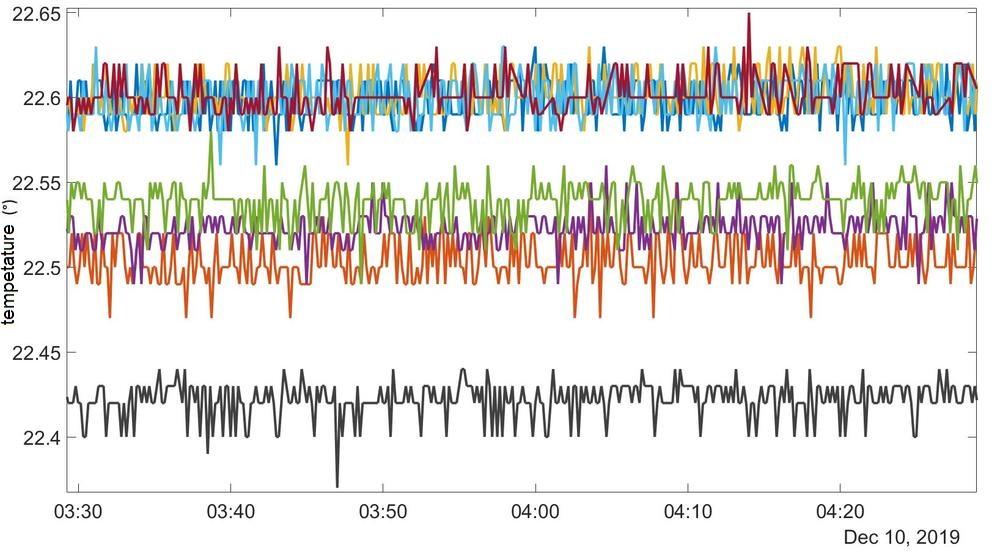
Regarding the measurement of RH, in this case, the difference between RHmax and RHmin was 2.03%. Again, this is the difference between the extreme values, which occur only occasionally. Therefore, when measuring RH with one device, we can count on an RH measurement error of ± 2%.
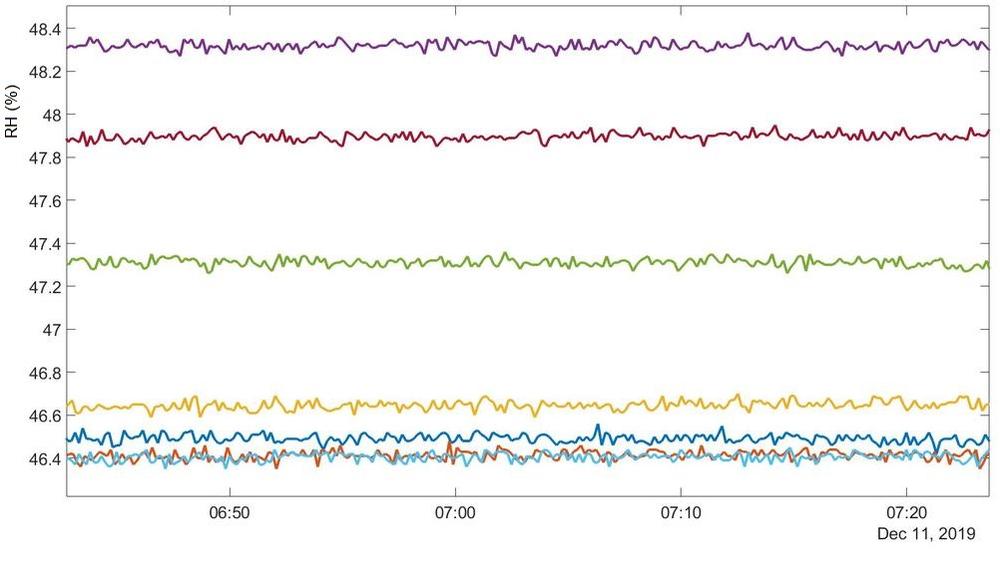
Several SHT31 devices can be applied to various types of temperature and RH measurements. During July 2019, seven SHT31 were placed on different floors of our workplace, including basements.
The light blue curve located at the very bottom of the graph illustrates the temperature in the basement laboratory. The dark blue "zigzag" curve shows the temperature in the office. The yellow, wavy curve represents the temperature changes in the entrance hall on the 2nd floor of the building, etc.
This way, we can get an overview of temperature changes in different rooms within one building. It is clear from the graph that the temperature difference in the building is almost 10 °C.
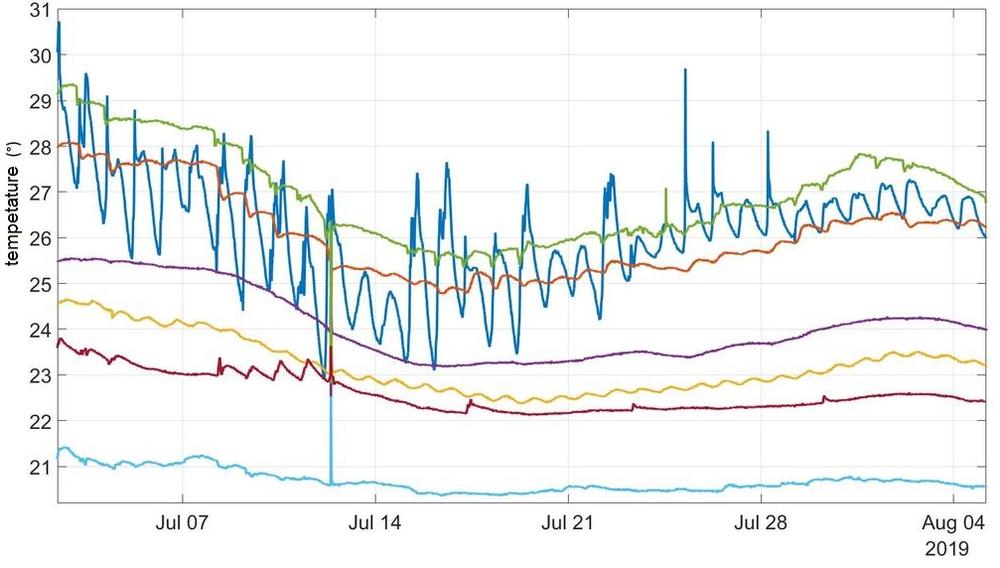
It may seem more interesting to measure RH, where a larger RH could be measured in the basement compared to other rooms of the workplace. The colours in both graphs correspond to the same rooms.
For example, humidity in the laboratory located in the basement (light blue curve) in the week from 28.7. to 4.8.2019 exceeded RH 75%, which means that such a place would not be suitable for storage of, e.g. UT 803 and UT 805 multimeters, which require RH <75%. Also, values close to 75% RH persisted in the laboratory for approximately two weeks.
In other rooms and laboratories, RH does not exceed 65%.
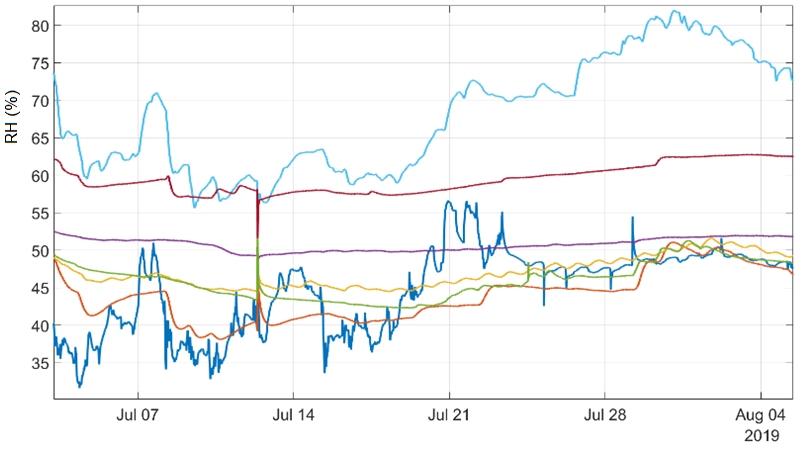
At the end of this section on the experience with the SHT31 SMART GADGET, we would like to add one more observation.
When measuring the water temperature, water entered the protective container. The SHT31 was wet, and the display showed no data. After immediate removal of the battery, wiping, drying for several hours at room temperature and reinserting the battery, the SHT31 SMART GADGET again measured RH and ambient temperature.
TEMPERATURE AND RH MEASUREMENT BY OTHER SENSORS
In addition to the mentioned SHT31 SMART GADGET device, SOS electronic also offers discrete sensors capable of measuring both temperature and RH. However, they must be connected to an Arduino device capable of transmitting and storing the measured data.
Compared to the SHT31 SMART GADGET, this is not a "ready-to-use" complex device. It will be necessary to program everything and revive, e.g. data storage on SD card or wifi module (according to the type of Arduino used) required for export of measured data to the server, where further data processing will take place. Sensor outputs such as analogue, digital or I2C are not a problem for the Arduino, so it is up to the user which sensor to choose.
Of course, the error with which the given sensor measures is also essential information. For example, the SHT 31D BOB sensor measures with an error of ± 2% RH ± 0.3°C.
The SHT 85 sensor measures with an error of ± 1.5% RH ± 0.1°C. As the abbreviation SHT indicates, these are Sensirion products (letter S) capable of measuring relative humidity RH (letter H) and temperature (letter T). Another sensor that can be found in the SOS electronic offer is Dallas DS 18B20+. It is a 1-Wire digital sensor that only measures temperature with an error of ± 0.5°C.

Of course, the mentioned measurement errors apply only to a specific range of measured quantities. Therefore datasheets are a handy aid when designing a more complex measuring device and the evaluation of the measurement error.
It would be interesting to compare what values will be measured at a constant temperature, and therefore all three types of sensors were tested along with SHT31 SMART GADGET.
The SHT 31D BOB, SHT 85 and DS 18B20+ sensors were connected to the Arduino Nano with the results being stored on an SD card. The devices were stored in a box (in the picture we can see 8x Dallas DS 18B20+, 6x SHT31 SMART GADGET a 1x SHT 85) and Arduino Nano with SHT 31D BOB was stored outside the box.
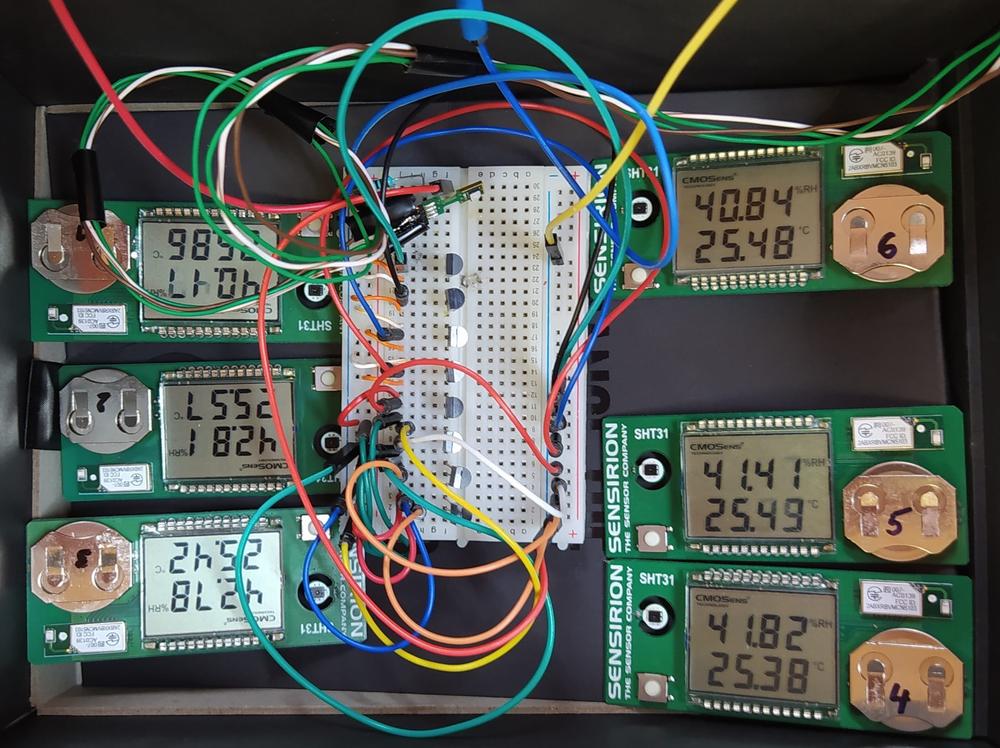
The measurement took place at the workplace during the weekend when a minimal temperature change was assumed. In total, it was 65 hours of measurement. That is how long the 5,000 mAh power bank lasted.
The Arduino microcontroller measured continuously also because the measurement interval was less than 30sec (3s), which means it was not necessary to put it into sleep mode, because otherwise, it would consume more energy during "waking up and sleeping" by total initialization than in standby mode waiting for instructions.
SHT31 SMART GADGET measured RH and temperature in the 1-minute interval in order not to exceed ≈ 9000 record lines. Despite removing the battery, removing the devices, and re-adding them to SensirionMyAmbience, occasional brief outages were recorded in the data log.
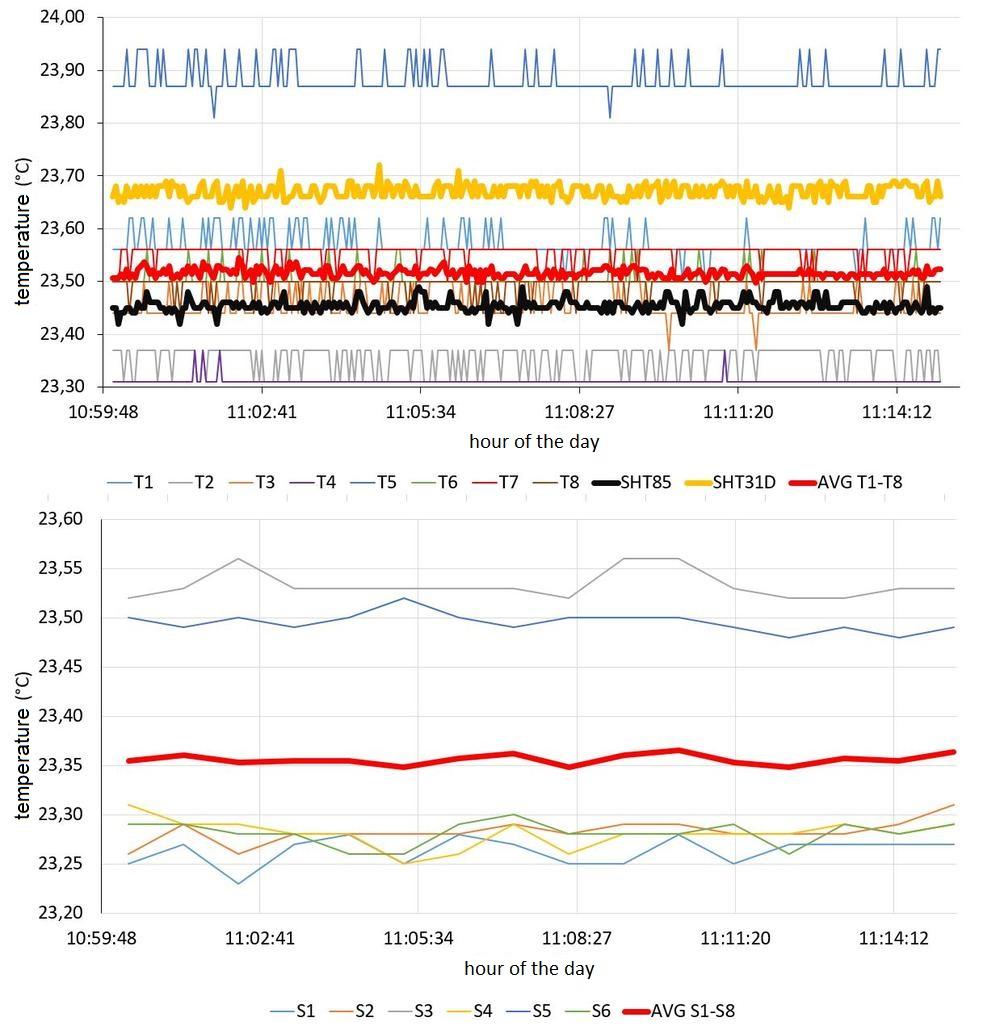
The above image, during the selected 15 min of the value record, illustrates the temperature measured by eight Dallas DS 18B20+ sensors (T1 - T8 - thin lines). The thick black curve shows the temperature measured by one SHT 85 sensor, and the thick yellow curve represents the temperature measured by one SHT 31D BOB.
The rough red curve represents the average value calculated from the eight Dallas DS 18B20 +.
The image clearly shows the advantage of multiple measurements of a quantity by several sensors, which results in a more accurate measurement.
Multiple measurements also reveal the actual variance of the measuring devices. For example, one Dallas DS 18B20+ shows approximately 0.3°C more than the other 7. Overall, the variance of the measured temperature (tmax – tmin) was 0.63°C.
The picture below shows the temperatures measured in one minute intervals by six SHT31 SHT31 SMART GADGET, while the thick red curve is the average value of the measured temperature.
By comparing the individual temperature curves, we found that:
• 8 Dallas DS 18B20+ sensors (± 0.5°C) measured temperatures ranging from 23.31°C to 23.94°C (tmax- tmin = 0.63°C). However, the average temperature ranged from 23.50°C to 23.55°C (tmax- tmin = 0.05°C),
• 6 SHT31 SMART GADGET devices (RH ±2%, ±0.3°C) measured the temperature in the range from 23.23°C to 23.56°C (tmax- tmin=0,33°C). The average temperature ranged from 23.35°C to 23.37°C (tmax- tmin=0,02°C),
• 1 SHT 31D BOB sensor (±2% RH ±0,3°C ) measured the temperature in the range from 23.64°C to 23.72°C (tmax- tmin=0,08°C),
• and the most accurate 1 SHT 85 sensor (±1.5% RH ±0.1°C) measured the temperature in the range from 23.42°C to 23.51°C (tmax- tmin=0,09°C).
The following figure shows these observations.
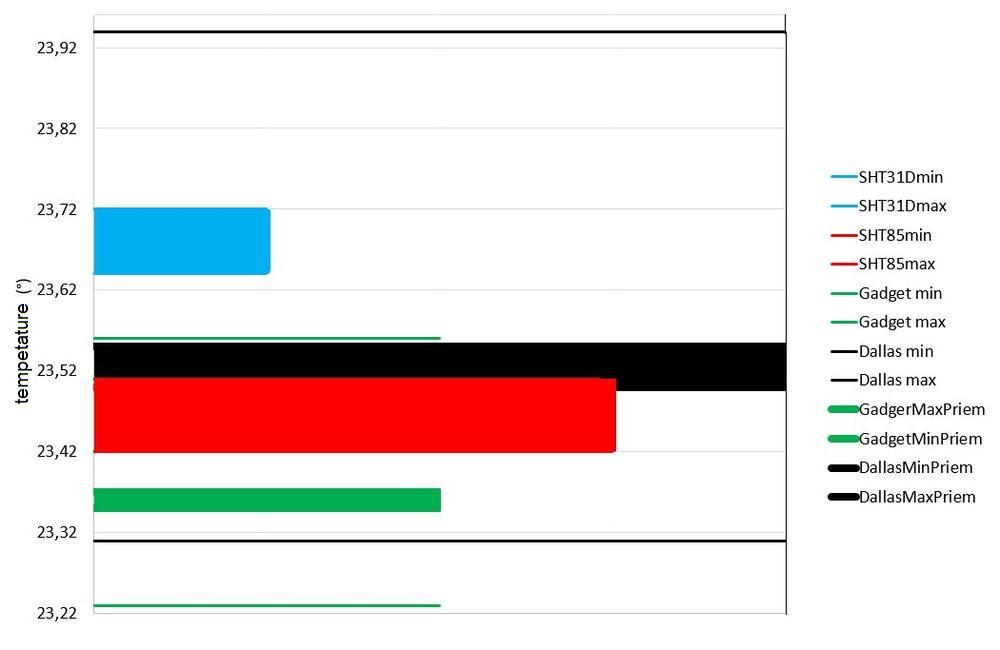
Also, in this case, since one piece of SHT 85 was used, the range of measured temperature is indicated by a thick red line.
Black resp. the thick green line represents the range of average temperature calculated from 8 pcs Dallas DS 18B20+ resp. from 6 pcs SHT31 SMART GADGET.
Of course, measurement with several SHT 31D BOB, or SHT 85 would be worth considering. Regarding the measurement of RH, the RH changed during the weekend as illustrated. In this article, however, we wanted to point out the measurement of temperature or RH by one sensor and several sensors simultaneously, which makes the measurement more accurate.
Regarding the measurement of RH, the RH changed during the weekend, as illustrated below.
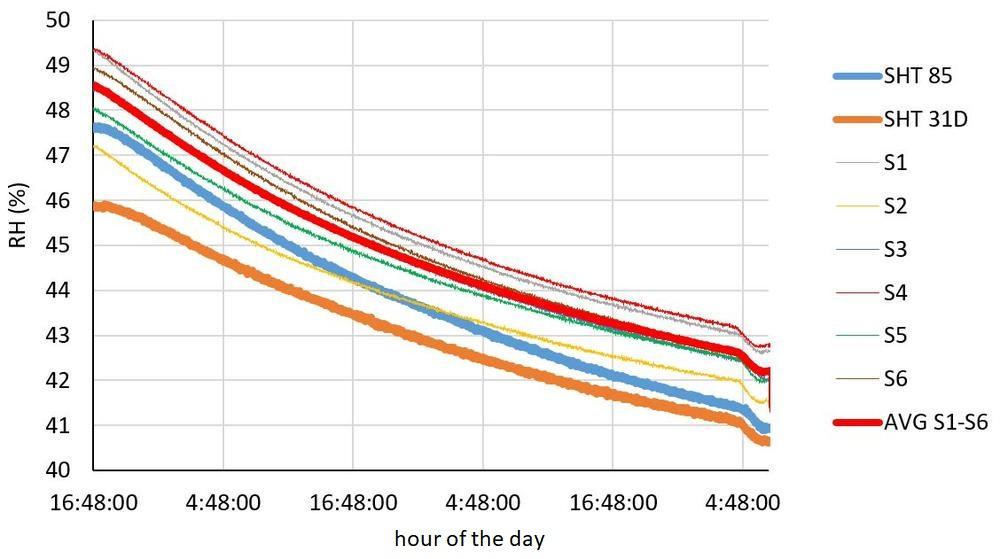
The other two thick courses of change in RH correspond to the measurements of SHT 31D BOB - brown and SHT 85 - light blue colour. It is interesting that at the beginning of the graph RHmax – RHmin is ≈ 3% and after 60 hours of measurement it is already ≈ 2%, as stated by the manufacturer (RH ± 2%).
Conclusion
Currently, there is a relatively large selection of sensors measuring temperature or RH and other quantities, e.g. in connection with air quality. It is solely up to the user which sensor to choose, e.g., from the SOS electronic offer. However, in addition to the price, it is also necessary to consider their error with which the sensor measures and the provided output.
Moreover, the user can increase the measurement accuracy and thus minimise the measurement error when measuring with multiple sensors at the same time as compared to using only one sensor.
Article authors:
doc. Ing. Milan Guzan, PhD.,
Ing. Adam Fehér,
Bc. Róbert Mitro
Do you like our articles? Do not miss any of them! You do not have to worry about anything, we will arrange delivery to you.




